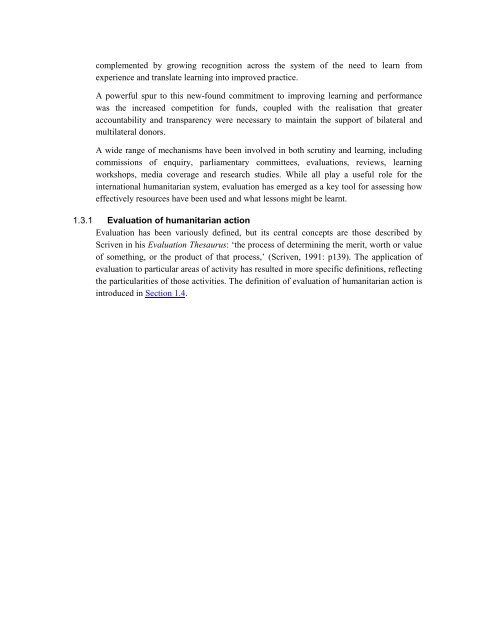Download PDF - ReliefWeb
Download PDF - ReliefWeb
Download PDF - ReliefWeb
Create successful ePaper yourself
Turn your PDF publications into a flip-book with our unique Google optimized e-Paper software.
complemented by growing recognition across the system of the need to learn from<br />
experience and translate learning into improved practice.<br />
A powerful spur to this new-found commitment to improving learning and performance<br />
was the increased competition for funds, coupled with the realisation that greater<br />
accountability and transparency were necessary to maintain the support of bilateral and<br />
multilateral donors.<br />
A wide range of mechanisms have been involved in both scrutiny and learning, including<br />
commissions of enquiry, parliamentary committees, evaluations, reviews, learning<br />
workshops, media coverage and research studies. While all play a useful role for the<br />
international humanitarian system, evaluation has emerged as a key tool for assessing how<br />
effectively resources have been used and what lessons might be learnt.<br />
1.3.1 Evaluation of humanitarian action<br />
Evaluation has been variously defined, but its central concepts are those described by<br />
Scriven in his Evaluation Thesaurus: ‘the process of determining the merit, worth or value<br />
of something, or the product of that process,’ (Scriven, 1991: p139). The application of<br />
evaluation to particular areas of activity has resulted in more specific definitions, reflecting<br />
the particularities of those activities. The definition of evaluation of humanitarian action is<br />
introduced in Section 1.4.
















![CynefinFramework final [Read-Only]](https://img.yumpu.com/19017304/1/190x135/cynefinframework-final-read-only.jpg?quality=85)